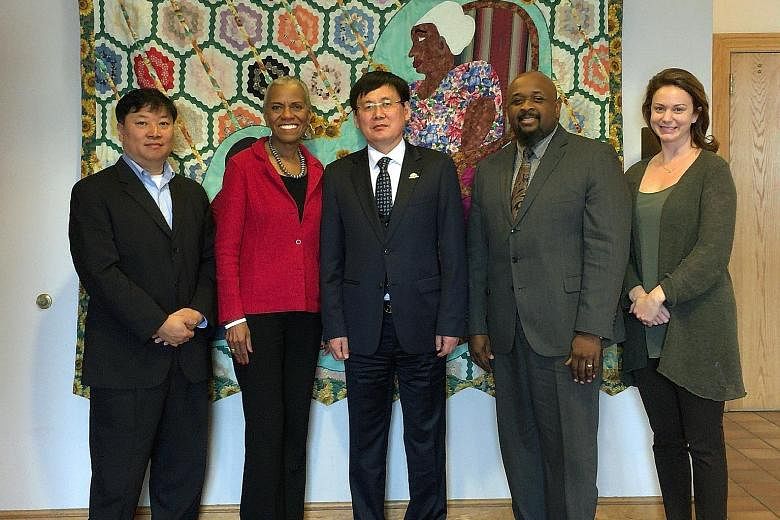Mr Jung Gwang Il, a prominent North Korean prison camp survivor turned defector, is used to having a plain-clothes police officer shadow him wherever he goes in South Korea.
The South Korean government has provided security for the 54-year-old human rights activist, who continues to campaign publicly against the regime in Pyongyang, since he arrived in Seoul in 2004.
The security around Mr Jung has been tightened in the past month, with two police officers now shadowing him and more frequent patrols being mounted around where he lives.
The move follows the assassination of Mr Kim Jong Nam in Kuala Lumpur last month. The brazen attack on the half-brother of North Korean dictator Kim Jong Un prompted the authorities here to ramp up security for high-profile defectors, who have also been urged not to travel.
Some defectors, including Mr Thae Yong Ho - who jumped ship in London last year and became the highest-ranking North Korean diplomat to renounce his homeland - have begun assuming a lower profile, cancelling their public activities.
But not Mr Jung, the head of an organisation called No Chain, which smuggles information about the outside world to North Korea.
He travelled earlier this month to speak out against the North Korean regime at the Birmingham Committee on Foreign Relations in the United States and at Spain's Internet Freedom Festival.
He told The Sunday Times that the murder in Kuala Lumpur has "emboldened and encouraged" him to speak out even more, as it does for other defectors.
"The threats, empty or otherwise, from the regime will not silence those who attempt to speak out," he added.
More than 30,000 North Koreans have defected to the South since a famine at home in the mid-1990s drove many to flee.
The number of defectors arriving every year began dropping shortly after Mr Kim assumed power in 2011 and tightened his control over the hermit kingdom.
But the number spiked last year. It grew by about 18 per cent, with more from the elite in North Korea crossing over.
South Korea has an official policy of encouraging defections and helping those who defect to adjust to a new life.
All defectors receive support from the Ministry of Unification, which has set aside 111 billion won (S$138.9 million) this year to run its defector programmes. They include a 12-week training programme on resettlement, financial aid and job placement schemes.
In a bid to lure more from the elite to flee the North, the ministry has also announced that it will quadruple the cash reward for defectors who arrive with critical information such as military intelligence. The payout has jumped from US$217,000 (S$303,500) to US$860,000.
High-ranking North Korean officials who defect also receive round-the-clock protection and are offered jobs at the Institute for National Security Strategy, a think-tank run by Seoul's intelligence service, so that they can shed light on the inner workings of the secretive Kim regime. It is not known how many defectors have received these privileges.
South Korea's North Korean Human Rights Ambassador Lee Jong Hoon said that only a "select few" warrant round-the-clock police protection - usually high-ranking officials or activists critical of the North, who are denounced as "enemies of the state" by Pyongyang.
He cited Mr Park Sang Hak, who runs a propaganda campaign against the North with balloons containing leaflets, flash drives and even dollar bills, and Mr Kim Sung Min, who manages an anti-North radio station in Seoul.
The ambassador said that South Korea welcomes more defectors and has the capacity to take in "a lot more".
"Last year we had more officials and members of the elite coming, which also means the reason for defection is changing. Now they come because they want freedom and a different lifestyle, and not because they are starving," he said.
Like most defectors, Mr Jung is now campaigning for reunification.
"The Kim Jong Un regime needs to be removed from power and the Korean peninsula reunified," he said. "The government should support defector groups and human rights organisations to carry out their work and speed up the collapse of the regime and bring about change in North Korea."

